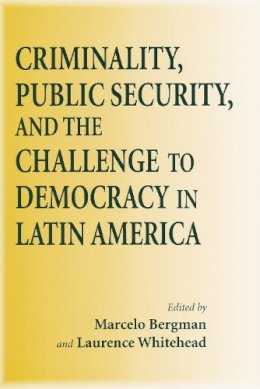
Criminality, Public Security, and the Challenge to Democracy in Latin America (ND Kellogg Inst Int'l Studies)
Marcelo Bergman (Ed.)
As new democratic regimes take root in Latin America, two of the most striking developments have been a dramatic rise in crime rates and increased perception of insecurity among its citizens. The contributors to this book offer a collective assessment of some of the causes for the alarming rise in criminal activity in the region. They also explore the institutional obstacles that states confront in the effort to curb criminality and build a fairer and more efficient criminal justice system; the connections between those obstacles and larger sociopolitical patterns; and the challenges that those patterns present for the consolidation of democracy in the region. The chapters offer both close studies of restricted regions in Latin America and broader examinations of the region as a whole.
The contributors to this volume are prominent scholars and specialists on the issue of citizen security. They draw on the latest methodologies and theoretical approaches to examine the question of how crime and crime fighting impact the consolidation of democracy and the rule of law in the region. These studies represent a major first step towards evaluating broadly a relative dearth of hard data about the Latin American security situation, as well as identifying future research paths. This book will be important for scholars, policy makers, and students, especially in the fields of Latin American and comparative law, political science, sociology, and criminology.
Contributors: Laurence Whitehead, Marcelo Bergman, Claudio Chaves Beato, Frederico Couto Marinho, Lucía Dammert, Mark Ungar, Hugo Frühling, Elena Azaola, Elvira María Restrepo, Luis Pásara, Ana Laura Magaloni, and John Bailey.
Product Details
About Marcelo Bergman (Ed.)
Reviews for Criminality, Public Security, and the Challenge to Democracy in Latin America (ND Kellogg Inst Int'l Studies)
